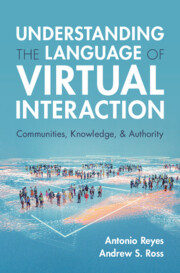Book contents
- Understanding the Language of Virtual Interaction
- Understanding the Language of Virtual Interaction
- Copyright page
- Contents
- Figures
- Tables
- 1 Introduction
- 2 Web 2, a Digital Revolution?
- 3 Digital Communication and the “Post-Truth” Era
- 4 The Formation of Virtual Communities
- 5 The Negotiation of Meaning, Knowledge, and Authority Online
- 6 (De)Legitimization of Authority in Digital Communication
- 7 Competition with Official Institutions
- 8 Politics and Participation in the Digital Public Sphere
- 9 Human Rights and Social Change in Virtual Spaces
- 10 Discourse and Identity in a Lawless Digital Universe
- 11 Conclusion
- References
- Index
9 - Human Rights and Social Change in Virtual Spaces
Published online by Cambridge University Press: 05 September 2025
- Understanding the Language of Virtual Interaction
- Understanding the Language of Virtual Interaction
- Copyright page
- Contents
- Figures
- Tables
- 1 Introduction
- 2 Web 2, a Digital Revolution?
- 3 Digital Communication and the “Post-Truth” Era
- 4 The Formation of Virtual Communities
- 5 The Negotiation of Meaning, Knowledge, and Authority Online
- 6 (De)Legitimization of Authority in Digital Communication
- 7 Competition with Official Institutions
- 8 Politics and Participation in the Digital Public Sphere
- 9 Human Rights and Social Change in Virtual Spaces
- 10 Discourse and Identity in a Lawless Digital Universe
- 11 Conclusion
- References
- Index
Summary
As a “convergence culture” (Jenkins, 2006), virtual spaces amplify underrepresented voices, fostering debates on human rights and influencing policies. This chapter examines gender equity, focusing on the #MeToo movement and non-binary gender identities, including gender-neutral pronouns. Online anonymity provides vulnerable populations with a supportive network in virtual communities, enabling them to engage in debates on protective policies. These virtual discussions hold transformative potential for advancing recognition and protection for marginalized communities despite challenges posed by digital inequalities and polarized debates.
Indeed, digital activism can fuel reactionary movements. The discussion on representing gender identities through language pronouns has led YouTube and YouTubers to disable comments, aiming to protect free expression and prevent harassment. Prominent conservative figures oppose gender-neutral pronouns, claiming it infringes on free speech, a stance that has garnered significant controversy online. Videos supporting these views contribute to hostility against gender minorities. In Spanish contexts, discussions on inclusive language face additional challenges, with resistance from bodies like the Royal Spanish Academy. Public language forums often censor these discussions, violating freedom of expression. Antagonistic behaviors like trolling and cyberbullying further stifle essential conversations, raising questions about the need for regulatory interventions to protect vulnerable populations and uphold democratic discourse.
Information
- Type
- Chapter
- Information
- Understanding the Language of Virtual InteractionCommunities, Knowledge, and Authority, pp. 133 - 152Publisher: Cambridge University PressPrint publication year: 2025
Accessibility standard: WCAG 2.2 AAA
Why this information is here
This section outlines the accessibility features of this content - including support for screen readers, full keyboard navigation and high-contrast display options. This may not be relevant for you.Accessibility Information
Content Navigation
Allows you to navigate directly to chapters, sections, or non‐text items through a linked table of contents, reducing the need for extensive scrolling.
Provides an interactive index, letting you go straight to where a term or subject appears in the text without manual searching.
Reading Order & Textual Equivalents
You will encounter all content (including footnotes, captions, etc.) in a clear, sequential flow, making it easier to follow with assistive tools like screen readers.
You get concise descriptions (for images, charts, or media clips), ensuring you do not miss crucial information when visual or audio elements are not accessible.
You get more than just short alt text: you have comprehensive text equivalents, transcripts, captions, or audio descriptions for substantial non‐text content, which is especially helpful for complex visuals or multimedia.
Visual Accessibility
You will still understand key ideas or prompts without relying solely on colour, which is especially helpful if you have colour vision deficiencies.
You benefit from high‐contrast text, which improves legibility if you have low vision or if you are reading in less‐than‐ideal lighting conditions.
